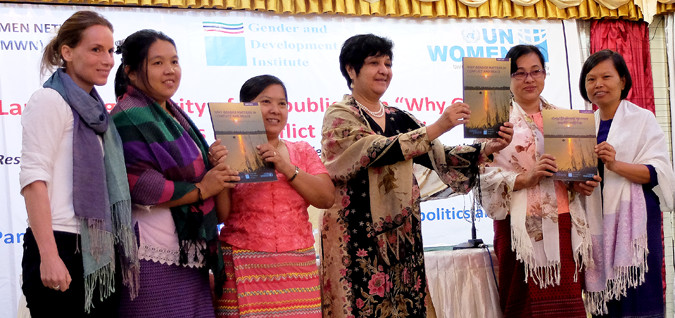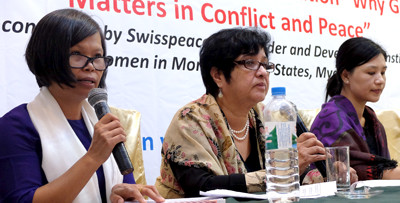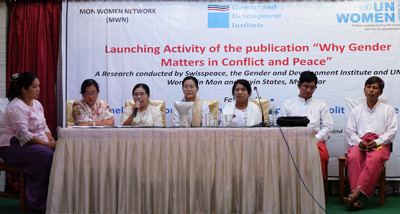Mon State, Myanmar: Launch of Publication, “Why Gender Matters in Conflict and Peace: Perspectives from Mon and Kayin States”
Swisspeace, Gender and Development Institute, UN Women, 2015Date:
Yangon, Myanmar - Conflict affects women and men differently and puts their lives and properties at different risks. However, women are not just victims of conflict. Mon and Karen women engage within their communities in creative strategies to mitigate the impact of conflict and contribute in many ways to peace. Yet their contributions to peace are generally unrecognised and undocumented, and women are largely absent in political decision-making and the peace process.

These are some of the key findings of the research study “Why Gender Matters in Conflict and Peace”, conducted by the Gender and Development Institute, Swisspeace and UN Women in Mon and Kayin States and launched on 24 November in Mawlamyine, Mon State, Myanmar. The launch brought together around 100 participants representing the State Government Departments, political parties, Mon women’s groups, civil society organisations, and international and non-governmental organisations. The event was organised by the Mon Women Network (MWN), the Gender and Development Institute and UN Women.
According to Mi Baloa Nye, Central Committee Member of Mon Women Organisation (MWO), men make up most of the combatants as combat is seen as a male terrain. Men are therefore more vulnerable to injury and death which is a big concern. Death and injury of men increase women’s workloads, as they become the main income earners, having to provide for the social, economic and cultural needs of children and household members in crisis. When women die in conflict, it is just another death. If women suffer disability they could be stigmatised and if unmarried they may find it difficult to find a life partner. Mi Cherry Soe, Assistant Leader of MWN, discussed other problems women face such as sexual and other violence and its traumatic impacts; loss of land and productive assets; fear and trauma resulting from a constant lack of physical safety and security; and engaging in the worst forms of labour because of lack of employment.

However, as demonstrated in the study, Mi Kun Chan Non, Leader of MWN and Director of MWO, also highlighted that women are not just victims of conflict and pointed out Mon women’s important contributions to conflict prevention and protection of their families and communities. Women developed civilian protection and early warning strategies such as negotiating with conflicting parties not to fight in civilian inhabited areas, to protect life and property; or alerting their family and community networks by word of mouth of possible outbreak of conflict; or sending children and the elderly to hide in forests or stay with relatives in non-conflict areas. Mi More Chai, Committee Member of MWN, stressed women’s leadership experience as Mon women draw on their local knowledge, attributes and skills, leadership abilities and networks they developed through their socially mediated roles. They use this to contribute to mitigate, resolve and prevent conflict, and to engage in long-term recovery and peacebuilding.
Dr. Jean D’Cunha, Head of UN Women Myanmar, said “the study brings to light the deep understanding that Mon and Karen women have of the impact of conflict, not only on themselves, but also on their families and communities. This places them in the best position to represent their concerns and priorities in peace negotiations. The inclusion of women and their priorities in the peace process is important as it would enhance its quality and inclusiveness, thereby contributing to its sustainability. Creating space and facilitating opportunities for women’s contributions to the peace process has been an important focus of UN Women’s work in Mon State.

The launch was followed by a session on the inclusion of women and their priorities in the Framework for Political Dialogue. Thuzar Thant, EBO Myanmar Country Manager, presented the common elements of the Framework, and Mi Kun Chan Non elaborated the key outcomes of a consultation organised by UN Women and EBO on women and the political dialogue, which include 30 percent women’s representation and at least one woman per delegation; representation of women in senior decision-making positions and in all task forces of the dialogue; and discussion of every thematic area also from a gender perspective.
A subsequent exchange followed between Mon women’s groups and senior representatives of political parties in which Mon women’s collective demands were debated. Mon Women Network pointed out that “Mon women have developed a common political agenda of their priorities for the peace process. Two of these collective demands are the inclusion of a quota system in every political party and organisation to ensure women’s participation, and the creation of opportunities for 30 percent women’s participation in politics and the peace building process.” The women’s political agenda was then adopted by the women’s groups and released to the press.
UN Women, in collaboration with its partner organisations, has been supporting initiatives promoting women’s political participation and empowerment in the peace process in the last two years.